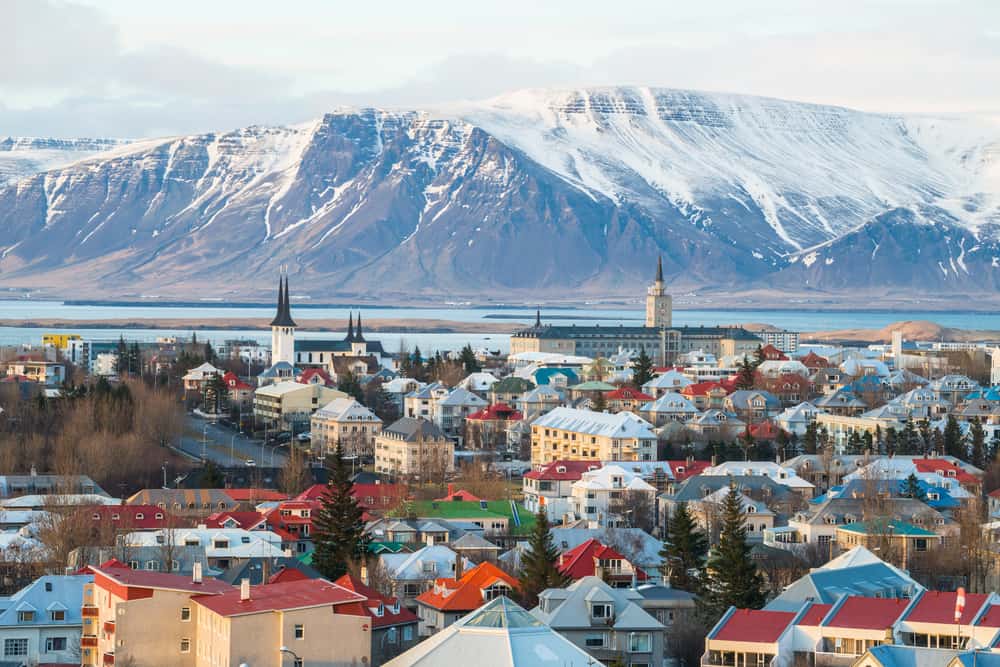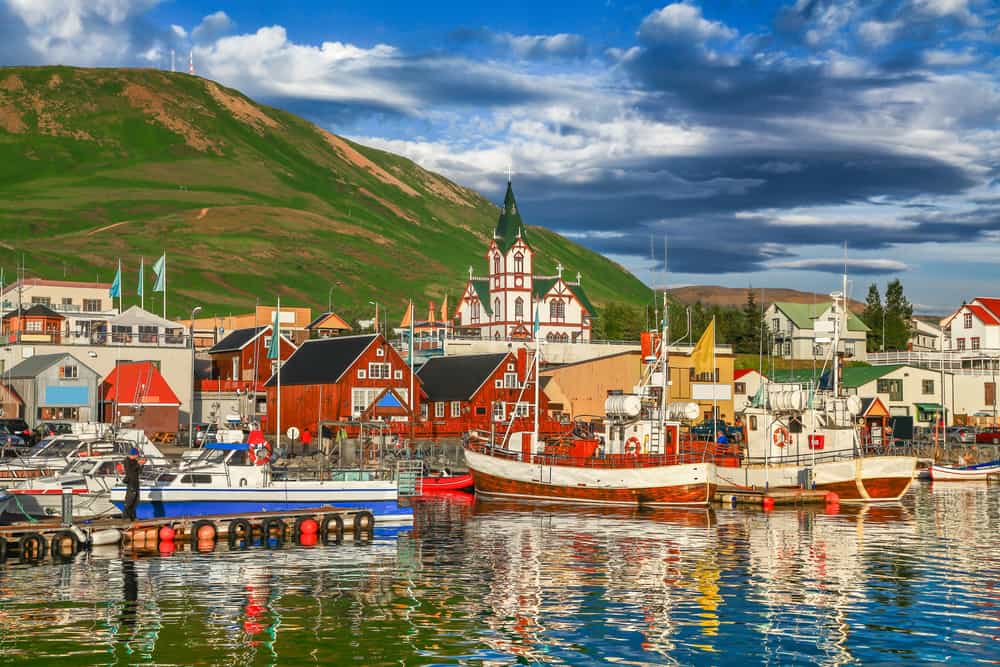 Although it’s just 846 miles away from the United Kingdom, Iceland brings an entirely different topography with approximately 130 active and inactive volcanoes, as well as plenty of mountainous peaks and icefields to admire and explore.
Although it’s just 846 miles away from the United Kingdom, Iceland brings an entirely different topography with approximately 130 active and inactive volcanoes, as well as plenty of mountainous peaks and icefields to admire and explore.
If you are considering making the move from the United Kingdom to Iceland, this guide will tell you everything you need to know – from visa requirements to cost of living differences; healthcare top tips to rules about moving country with your pets – helping you to feel empowered when the time comes to make the big move.
Quick Iceland Facts:
- Population: 372,520 (2021 estimate)
- Official Language: Icelandic (de facto) with English being spoken as a second language by most native Icelanders, as well as Danish, German, Spanish and French
- GDP Per Capita: $68,727 USD (2021 estimate)
- Random Fact: Iceland is thought to be the last place to be settled by humans – Vikings reportedly discovered Iceland by accident!
- Currency: Icelandic Króna (kr). As of 2024, £1 = 180.78 kr, €1 = 151.10 kr, $1 USD = 135.08 kr, $1 CAD = 100.56 kr, $1 AUD = 92.93 kr
1. Moving Costs to Iceland from the UK
The table below shows the estimated cost of hiring a 20- or 40-foot container from the 10 largest cities in the UK, and shipping it to Reykjavik:
| Origin City | 20FT | 40FT |
|---|---|---|
| Birmingham | £950 - £1,050 | £1,700 - £1,800 |
| Bristol | £1,000 - £1,100 | £1,800 - £1,900 |
| Glasgow | £1,050 - £1,150 | £1,900 - £2,000 |
| Leeds | £1,030 - £1,130 | £1,850 - £1,950 |
| Liverpool | £1,020 - £1,120 | £1,830 - £1,930 |
| London | £1,150 - £1,250 | £2,000 - £2,100 |
| Manchester | £1,040 - £1,140 | £1,820 - £1,920 |
| Newcastle | £1,020 - £1,120 | £1,800 - £1,900 |
| Sheffield | £1,010 - £1,110 | £1,780 - £1,880 |
| Southampton | £1,000 - £1,100 | £1,760 - £1,860 |
- All figures are in GBP;
- The rates above are estimates only and may have changed since the time this article was updated (September 2024). They are based on the lowest estimated rate from either Freightos, Flexport, or Maersk;
- To get a more accurate idea of the cost for you, please use the quote form at the top of this page;
- Please also see our guide to international container shipping.
2. How Long Does It Take To Move to Iceland from the United Kingdom?
Let’s take a closer look at some common flight routes from the United Kingdom to Iceland to give you an idea of the time you may spend in the air during your big move.
- London Heathrow to Iceland – 3 hours, 15 minutes – £125
- London Gatwick to Iceland – 3 hours, 20 minutes – £120
- Luton to Iceland – 3 hours, 10 minutes – £40
- Edinburgh to Iceland – 2 hours, 30 minutes – £70
This duration covers the flight time only, so additional time will need to be added to get you from the terminal to your final location.
3. Moving Restrictions to Iceland from the UK
Moving from one country to take up residency in another will incur various restrictions – most notably, this comes in the form of visa requirements, which we will cover in the next section.
Your passport must be valid at the time of travel, and be issued less than 10 years before your date of entry to Iceland. It must have at least 3 months left on the expiry date.
You are able to travel to countries in the Schengen area – an area that allows people to travel freely between member countries without going through border controls, encompassing most EU countries – for up to 90 days in any 180-day period without a visa.
There are strict rules on customs, with it being illegal to carry whale products from Iceland into the UK or EU, with a £5,000 fine or imprisonment given to anyone who does. Similarly, if you are taking more than 10,000 euros out of Iceland, you must declare it at customs – Skatturinn has the most up-to-date information on customs and regulations.
There are currently no COVID-19 travel restrictions, but it’s advised that you keep up-to-date on any developments to ensure you are abiding by the most recent information at the time of travel.
4. Visa Requirements to Iceland from the UK
Alongside your valid UK passport, if you are planning on staying in Iceland for a long period or to work, you will need a visa. As Iceland is part of the Schengen area you are allowed to travel freely without a visa for up to 90 days in any 180-day period as previously stated.
Island.is has the best information regarding visa requirements for those travelling from the UK to Iceland. If you want to take up employment, you will need both a work permit and a long-stay ‘D’ visa.
The work permit will come from your employer, or whomever is giving you an offer of employment, and must be sent off along with your visa application. Application time can take up to 180 days, so it is important to plan ahead for as long as possible to avoid delays in paperwork.
To be eligible for a work visa, according to visadb.io you must have:
- A passport valid for at least 6 months
- The required skills for your job, as well as a job offer from an employer in Iceland
- Proof of sufficient funds, as well as an income to cover your cost of living
- Valid travel insurance
Gov.uk says that to apply for a job in Iceland, it may be necessary to provide a UK police certificate. In all cases, you need to speak to a visa specialist to advise you on your individual circumstances and always keep up to date with the latest changes in the rules.
5. Cost of Living Differences in Iceland
 While this article is covering Iceland as a whole, house prices will obviously vary from area to area but the figures below will give you an indication of what’s available at what price.
While this article is covering Iceland as a whole, house prices will obviously vary from area to area but the figures below will give you an indication of what’s available at what price.
As a general note, it is estimated that the cost of living in Iceland is 6.3% higher than that of the United Kingdom, with rent being around 39.8% lower.
Monthly Rental Prices in Iceland:
- 1 bedroom flat (apartment) in City Centre: 245,000+ kr
- 1 bedroom flat outside the City Centre: 206,000+ kr
- 3 bedroomed flat in City Centre: 350,000+ kr
- 3 bedroomed flat outside the City Centre: 300,000+ kr
Iceland Home Purchase Prices:
- Price per square metre (10.7 square feet) to buy in City Centre: 860,000+ kr
- Price per square metre (10.7 square feet) to buy outside the City: 675,000+ kr
Source: Numbeo
6. Tax Treaties in Iceland
Income earned in Iceland will be subject to personal income tax which can range from 22.5% to 31.8% depending on the gross income value. Corporate income tax is also in place, which is currently 20%, although there are reductions for certain types of income.
The Value Added Tax (VAT) in Iceland is 24%, which is applied to most goods and services, but a number of items may have a reduced rate of 11% and even 0% on some select products and services.
Iceland has entered into a double taxation treaty to avoid the double taxation of income, and non-residents are usually taxed on their income only from Icelandic employment.
It’s good to note that these figures and regulations can change over time, so it’s worthwhile keeping up-to-date with any developments.
7. Working Rules in Iceland
While you are permitted entry to Iceland under the Schengen area regulations without a visa, if you are planning on staying in Iceland for more than three months you will need to obtain the right of residence from the Directorate of Immigration in Iceland.
You can obtain a job seeker’s visa with the intention of finding work in Iceland for the duration of the visa. Once you have found work, you can then take the necessary steps to obtain residence in Iceland to extend your stay and have residency on the island.
Most Icelanders will speak English, but it may be advantageous to learn Icelandic to further your career opportunities – especially in more remote communities.
Whatever your employment circumstances, it’s important to have your visa ironed out before entering the country to ensure a smooth transition. It’s also important to get up to speed with taxes and any beneficial programs, such as healthcare schemes, so that you are completely clued up on your rights.
8. Healthcare in Iceland
While the United Kingdom benefits from the NHS, offering free healthcare to those who need it, as well as elective private healthcare for a fee, Iceland’s state healthcare is not fully free. The costs are covered through a range of funds from the state itself, as well as patient contributions.
Gov.uk says that patient contributions are ‘capped’ each month – meaning that once you have met a certain payment threshold, the rest of your treatment is free for the remainder of the month. This is determined by a range of factors, including your age if you have a disability, and your frequency of care.
If you need healthcare assistance in Iceland, Gov.uk says that as a UK citizen you must either:
- Register for a UK-issues S1 form
- Have private health insurance
- Register as a legal resident in Iceland, joining the state social insurance system
You’ll need to register as a resident if you’re planning on living in Iceland for more than 3 months, and you will need private health insurance for the first 6 months of your residency.
9. Rules Around Moving With Pets in Iceland
Moving house includes lots of boxes of belongings – but it can also include some particularly important furry friends, too! If you need to move to Iceland with a pet in tow, here’s what you need to know.
Importing pets into Iceland must comply with the MAST import conditions – these include, but are not limited to:
- Applying for and receiving an import permit from the Icelandic Food and Veterinary Authority (MAST)
- Fulfil health requirements, including vaccinations and tests
- Stay in quarantine for two weeks upon arrival
- The pet must be microchipped
The rules will differ if the origin country is classed as Category 1 or 2 – the UK falls into Category 1, meaning it has a zero incidence of rabies.
There are some prohibited breeds in Iceland according to Petraveller, which include:
- Dogo Argentino
- Pit Bull Terrier
- Staffordshire Bull Terrier
- Tosa Inu
- Dog breeds closely related to these breeds
It’s best to keep up-to-date with any changes to these rules and regulations when the time comes for your visit.
10. Similar Places
 Norway is said to be the most similar country to Iceland, owing to similar demographics and their mountainous landscapes. While Iceland may have a colder climate, Norway does have cold winters, and both are famed for their picturesque landscapes and vistas.
Norway is said to be the most similar country to Iceland, owing to similar demographics and their mountainous landscapes. While Iceland may have a colder climate, Norway does have cold winters, and both are famed for their picturesque landscapes and vistas.
Both countries favour renewable electricity and energy, including wind, geothermal and hydroelectric power. There is a high quality of life in both locations, with low crime rates, advanced healthcare and a strong sense of community.
Tourism is a big draw to both locations – featuring the Northern Lights in both countries! – as well as scenic landscapes. Norway and Iceland have stable economies and rich cultural heritage, including a strong focus on outdoor activities.
11. Pros and Cons of Moving to Iceland from the UK
Perhaps you’re moving for a new job opportunity, or just want to try out a completely different country and climate – whatever your reason for wanting to move from the UK to Iceland, let’s take a look at some of the main pros and cons associated with moving.
| Advantages of Moving from the UK to Iceland | Disadvantages of Moving from the UK to Iceland |
|---|---|
| Breathtaking Nature: Iceland boasts stunning landscapes, including waterfalls, volcanoes and glaciers offering a unique and picturesque environment | High Cost of Living: Iceland has a higher cost of living compared to the UK, with expenses such as housing, groceries, and dining being relatively expensive |
| Clean and Safe Environment: Iceland is known for its clean air, low crime rates, and a strong sense of safety, providing a secure living environment | Limited Job Market: The job market in Iceland may be limited, and finding suitable employment can be challenging |
| Renewable Energy: Iceland relies heavily on renewable energy sources like geothermal and hydroelectric power, contributing to a sustainable and eco-friendly lifestyle | Cold Climate: Iceland has a cold climate, with long winters and short days, which may be a significant adjustment for those accustomed to milder UK weather |
| Quality Education: Iceland offers a high standard of education with a focus on English-language programs at the university level and a generally positive learning environment | Isolation: Iceland's geographical location results in a degree of isolation, with limited accessibility to some goods and services compared to more centrally located countries |
Whatever you decide, you must understand the legal factors affecting your move – be sure to check Gov.uk for all the information you need.